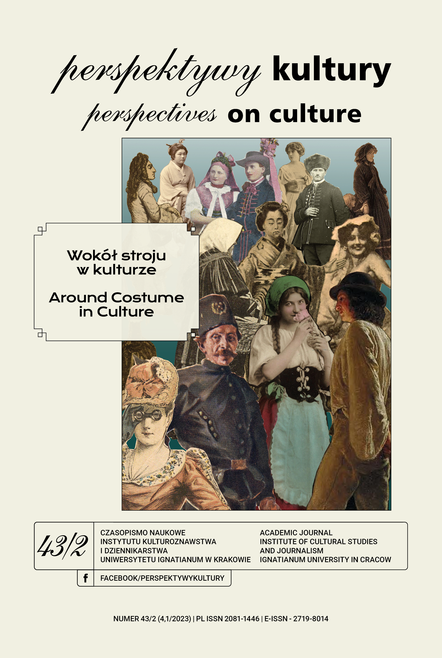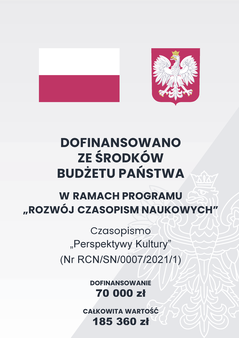Dzielenie się wiedzą wśród pracowników o zróżnicowanym stażu organizacyjnym – wyniki badań przeprowadzonych wśród polskiej kadry menedżerskiej
Abstrakt
Przedmiotem opracowania jest problematyka dzielenia się wiedzą wśród osób o zróżnicowanym stażu organizacyjnym. Opracowanie realizuje dwa cele: poznawczy i empiryczny. Poznawczym celem jest syntetyczne zaprezentowanie modeli organizacji wiedzy w kontekście autorskiej koncepcji funkcjonowania pracowników o zróżnicowanym stażu organizacyjnym. Empiryczny cel to uzyskanie odpowiedzi na pytanie: czy jest zależność między stażem organizacyjnym pracowników a poziomem dzielenia się wiedzą? Aby zrealizować cel empiryczny, zaplanowano badanie, w którym uczestniczyło 58 przedstawicieli polskiej kadry kierowniczej z 13 średniej wielkości przedsiębiorstw. Oceniali oni poziom dzielenia się wiedzy łącznie 272 pracowników za pomocą skali zwalidowanego kwestionariusza charakterystyki pracowników o zróżnicowanym stażu pracy. W wyniku przeprowadzonych badań okazało się, że istnieje zależność między poziomem dzielenia się wiedzą a stażem pracy pracowników posiadających dłuższe doświadczenie organizacyjne, jednak zależność ta nie występuje w przypadku osób o stażu organizacyjnym powyżej 14 lat.
Bibliografia
Al Alawi, A.I., Al Marzooqi, Y.N., & Mohammed, F.Y. (2007). Organizational culture and knowledge sharing: critical success factors. Journal of Knowledge Management, Vol. 11, No. 2, 22–42.
Argote, L., Ingram, P., Levine, J.M., & Moreland, R.L. (2000). Knowledge transfer in organizations: Learning from the experience of others. Organizational Behavior and Human
Decision Processes, 82(1), 1–8.
Bollinger, A.S. & Smith, R.D. (2001). Managerial organizational knowledge as a strategic asset. Journal of Knowledge Management, 5(1), 8–18.
Burmeister, A., & Deller, J. (2016). Knowledge retention from older and
retiring workers: What do we know, and where do we go from here?
Work, Aging and Retirement, 2, 87–10.
Burmeister, A., Fasbender, U., & Deller, J. (2018). Being perceived
as a knowledge sender or knowledge receiver: A multistudy investigation of the effect of age on knowledge transfer. Journal of Occupational and Organizational Psychology, 91, 518–545.
Cabrera, A., Collins, W., & Salgado, J. (2006). Determinants of individual engagement in knowledge sharing. International Journal of Human Resource Management; 245, 17–2.
Chow, W.S., & Chan, L.S. (2008), Social network, social trust and shared goals in organizational knowledge sharing. Information & Management, Vol. 45 No. 7, 458–465.
Civi, E. (2000). Knowledge management as a competitive asset: A review. Marketing Intelligence & Planning, 18, 166–174.
Cummings J.L., & Teng, B.S. (2003). Transferring r&d knowledge: the key factors affecting knowledge transfer success. Journal of Engineering and Technology Management; 39, 1–20.
Cummings, J.N. (2004). Work groups, structural diversity, and knowledge sharing in a global organization. Management Science, 50, 352–364.
Debowski, S. (2005). Knowledge Management: A Strategic Management Perspective. 1st Ed., John Wiley and Sons, Ltd.
Desouza K.C. & Awazu, Y. (2005). Segment and Destroy: the missing capabilities of knowledge management. Journal of Business Strategy, Vol. 26 No. 4, 46–52.
Edvinsson, L. &Malone, M.S. (2001). Kapitał intelektualny. Warszawa: PWN.
Ellwart, T., Bündgens, S., Rack, O. (2013). Managing knowledge exchange and identification in age diverse teams. Journal of Managerial Psychology, 28, 950–972.
Fazlagić, J. (2014). Innowacyjne zarządzanie wiedzą. Warszawa: Difin.
Finkelstein, S. (2005). When bad things happen to good companies: strategy failure and flawed executives. Journal of Business Strategy, Vol. 26 No. 2, 21–28.
Gaida, J. (2021). Intermentoring as a Key Method of Knowledge Sharing in Organizations Focused on Managing Generations. European Conference on Knowledge Management; Kidmore End, September 2021.
Gosseries, A.P. (2004). Are seniority privileges unfair? Economics and Philosophy, 20, 279–305.
Grant, R.M. (1996). Toward a knowledge-based theory of the firm. Strategic Management Journal, 17, 109–122.
Hamel, G., & Prahalad, C.K. (1999). Przewaga konkurencyjna jutra. Strategie przejmowania kontroli nad branżą i tworzenie rynków przyszłości. Warszawa: Business Press.
Hersch, J., & Reagan, P. (1999). Job Match, Tenure and Wages Paid by Firms, Economic Inquiry; 28, 3; Social Science Database, 488–507.
Hedlund, G. (1994). A model of knowledge management and the N-form corporation. Strategic Management Journal, Vol. 15, Special Issue: Strategy: Search for New Paradigms (Summer), 73–90.
Hilsen, A.I., & Sutherland Olsen, D. (2021). The Importance and Value of Older Employees. Wise Workers in the Workplace. New York: Palgrave Macmillan.
Holste, J.S., i Fields, D. (2010). Trust and tacit knowledge sharing and use. Journal of Knowledge Management, 14, 128–140.
Inkpen, A.C., & Tsang, E.W. (2005). Social capital, networks, and knowledge transfer. Academy of Management Review, 30, 146–165.
Joia, L.A., & Lemos, B. (2010). Relevant factors for tacit knowledge transfer within organisations. Journal of Knowledge Management, 14, 410–427.
Ipe, M. (2003). Knowledge sharing in organizations: A conceptual framework. Human Resource Development Review, 2, 337–359.
Li, W. (2010). Virtual knowledge sharing in a cross-cultural context. Journal of Knowledge Management, 14, 38–50.
Kearns, G.S., i Lederer, A.L. (2003). A resource-based view of strategic IT alignments: how knowledge sharing creates competitive advantage. Decision Sciences, 1: 34.
Krugiełka, A. (2019). Modelowanie CSR w odniesieniu do klienta wewnętrznego. Poznań: Wydawnictwo Politechniki Poznańskiej.
Lewicka, M. (1993). Aktor czy obserwator. Psychologiczne mechanizmy odchyleń od racjonalności w myśleniu potocznym. Warszawa–Olsztyn: Polskie Towarzystwo Psychologiczne.
Lin, H.F. (2007). Knowledge sharing and firm innovation capability: An empirical study. International Journal of Manpower, 28, 315–332.
Łapniewska, Z. (2013). Modele organizacji wiedzy. Retrieved from: http://ccnews.pl/2013/09/06/modele-organizacji-wiedzy/ (access: 05.09.2017).
Maurer, T.J., Weiss, E.M., & Barbeite, F.G. (2003). A model of involvement in work-related learning and development activity: The effects of individual, situational, motivational, and age variables. Journal of Applied Psychology, 88, 707–772.
Massa, S., & Testa, S. (2009). A knowledge management approach to organisational competitive advantage: evidence from the food sector. European Management Journal, 129:27.
McAdam, R., & McCreedy, S. (1999). A critical Review of Knowledge Management Models. The Learning Organization, Vol. 6, No. 3, 91-101, DOI:10.1108/09696479910270416.
Mesmer-Magnus, J.R., & DeChurch, L.A. (2009). Information sharing and team performance: A meta-analysis. Journal of Applied Psychology, 94, 535–546.
Morawiecka, E. (2013). Podmiotowe komponenty przedsiębiorczości w ujęciu teoretycznym i empirycznym – próba psychologicznej syntezy. In: J. Wasilczuk (ed.), Przedsiębiorczość w ośmiu odsłonach. Gdańsk: Politechnika Gdańska, Wydział Zarządzania i Ekonomii, 5, 59–72.
Nahapiet, J., & Ghoshal, S. (1998). Social capital, intellectual capital, and the organizational advantage. Academy of Management Review, 23, 242–266.
Nonaka, I., & Konno, N. (1998). The concept of “Ba”: Building a Foundation for Knowledge Creation. California Management Review, Vol. 40, No. 3 Spring, 40-54.
Nonaka, I., & Takeuchi, H. (2000). Kreowanie wiedzy w organizacji. Warszawa: Polska Fundacja Promocji Kadr.
Paulin, D., & Suneson, K. (2012). Knowledge Transfer, Knowledge Sharing and Knowledge Barriers – Three Blurry Terms in KM. The Electronic Journal of Knowledge Management, Volume 10, Issue 1, 82–92, www.ejk.com (access: 03.09.2019).
Pawlak, J. (2015), Wybrane psychologiczne determinanty przedsiębiorczości absolwentów w świetle koincydencji teorii rozwoju. Nierówności Społeczne a Wzrost Gospodarczy, nr 42, 399-408.
Price, D.P., Stoica, M., & Boncella, R.J. (2013). The relationship between innovation, knowledge, and performance in family and non-family firms: an analysis of SMEs. Journal of Innovation and Entrepreneurship, 2:14, 1–20.
Probst, G., Raub, S., & Romhardt, K. (1999). Wissen Managen. Wie Unternehmen Ihre Wertvollste Ressource Optimal Nutzen. Frankrurt: Gabler.
Probst, G., Raub, S., & Romhardt, K. (2002). Zarządzanie wiedzą w organizacji. Kraków: Oficyna Ekonomiczna.
Rice, B., Niger M., Fieger, P., & Taiba, H. (2022), Older healthcare workers’ satisfaction: managing the interaction of age, job security expectations and autonomy. Employee Relations. Bradford, 319–334. DOI: 10.1108/ER-07-2020-0346.
Sammons, P. (2005). Buying Knowledge. Effective Acquisition of External Knowledge. Burlington: Gower.
Sharkie, R. (2003). Knowledge creation and its place in the development of sustainable competitive advantage. Journal of Knowledge Management, 7(1), 20–31.
Su, E., & Daspit, J.J. (2021). Knowledge management in family firms: A systematic review, integrated insights, and future research opportunities. Journal of Knowledge Management, Vol. 26, Issue 2, 291–325. DOI: 10.1108/JKM-08-2020-0658.
Suurla R., Makkula M., & Mustajärvi, O. (2002). Developing and Implementing Knowledge Management in Parliament of Finland. Helsinki: Oy Edita.
Taylor, H. (2007). Tacit knowledge. International Journal of Knowledge Management, 3, 60–73.
Wang, S., & Noe, R.A. (2010). Knowledge sharing: a review and directions for future research. Human Resource Management Review, 115, 20–22.
Widen-Wulff, G., & Ginman, M. (2004). Explaining knowledge sharing in organisations through the dimensions of social capital. Journal of Information Science; 448, 30–35.
Yi, J. (2009). A measure of knowledge sharing behavior: Scale development and validation. Knowledge Management Research & Practice, 7, 65–81.
Zhou, S., Siu, F., & Wang, M. (2010). Effects of social tie content on knowledge transfer. Journal of Knowledge Management, 14, 449-463.
Żarczyńska-Dobiesz, A., & Boniecka, K.(2022) Diversity at Work Place: Building the Commitment of four Generations. European Research Studies, Vol. 25, Issue 2, 19–30.
Copyright (c) 2023 Perspektywy Kultury

Utwór dostępny jest na licencji Creative Commons Uznanie autorstwa 4.0 Międzynarodowe.
Autor, zgłaszając swój artykuł, wyraża zgodę na korzystanie przez Wydawnictwo Uniwersystet Ignatianum z utworu na następujących polach eksploatacji:
- utrwalania utworu w formie papierowej, a także na nośniku cyfrowym lub magnetycznym;
- zwielokrotnienia utworu dowolną techniką, bez ograniczenia ilości wydań i liczby egzemplarzy;
- rozpowszechniania utworu i jego zwielokrotnionych egzemplarzy na jakimkolwiek nośniku, w tym wprowadzenia do obrotu, sprzedaży, użyczenia, najmu;
- wprowadzenia utworu do pamięci komputera;
- rozpowszechniania utworu w sieciach informatycznych, w tym w sieci Internet;
- publicznego wykonania, wystawienia, wyświetlenia, odtworzenia oraz nadawania i reemitowania, a także publicznego udostępniania utworu w taki sposób, aby każdy mógł mieć do niego dostęp w miejscu i czasie przez siebie wybranym.
Wydawca zobowiązuje się szanować osobiste prawa autorskie do utworu.






